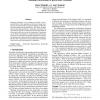Free Online Productivity Tools
i2Speak
i2Symbol
i2OCR
iTex2Img
iWeb2Print
iWeb2Shot
i2Type
iPdf2Split
iPdf2Merge
i2Bopomofo
i2Arabic
i2Style
i2Image
i2PDF
iLatex2Rtf
Sci2ools
108
click to vote
AAAI
2008
2008
Minimal Contraction of Preference Relations
Changing preferences is very common in real life. The expressive power of the operations of preference change introduced so far in the literature is limited to adding new information about preference and equivalence. We discuss the operation of discarding preferences - preference contraction. We argue that the property of minimality and the preservation of strict partial orders are crucial for contractions. Contractions can be further constrained by specifying which preferences should not be contracted. We provide algorithms for computing minimal and minimal preference-protecting contraction. We also show some preference query optimization techniques which can be used in the presence of contraction. Content areas: Knowledge Representation, Knowledge Engineering, Databases
Related Content
| Added | 02 Oct 2010 |
| Updated | 02 Oct 2010 |
| Type | Conference |
| Year | 2008 |
| Where | AAAI |
| Authors | Denis Mindolin, Jan Chomicki |
Comments (0)

